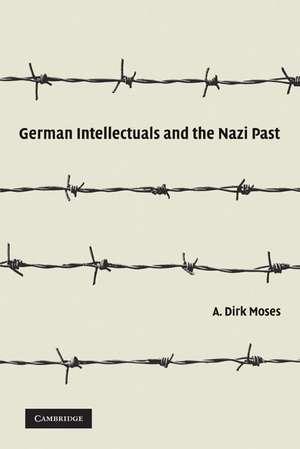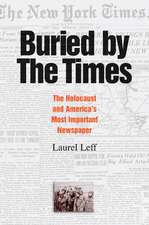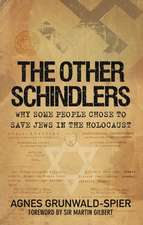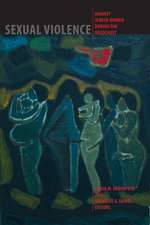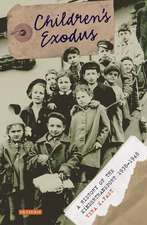German Intellectuals and the Nazi Past
Autor A. Dirk Mosesen Limba Engleză Paperback – 30 aug 2009
| Toate formatele și edițiile | Preț | Express |
|---|---|---|
| Paperback (1) | 231.98 lei 6-8 săpt. | |
| Cambridge University Press – 30 aug 2009 | 231.98 lei 6-8 săpt. | |
| Hardback (1) | 530.39 lei 3-5 săpt. | +25.04 lei 6-12 zile |
| Cambridge University Press – 23 sep 2007 | 530.39 lei 3-5 săpt. | +25.04 lei 6-12 zile |
Preț: 231.98 lei
Nou
Puncte Express: 348
Preț estimativ în valută:
44.39€ • 46.59$ • 36.84£
44.39€ • 46.59$ • 36.84£
Carte tipărită la comandă
Livrare economică 10-24 aprilie
Preluare comenzi: 021 569.72.76
Specificații
ISBN-13: 9780521145718
ISBN-10: 0521145716
Pagini: 304
Dimensiuni: 152 x 226 x 18 mm
Greutate: 0.3 kg
Editura: Cambridge University Press
Colecția Cambridge University Press
Locul publicării:New York, United States
ISBN-10: 0521145716
Pagini: 304
Dimensiuni: 152 x 226 x 18 mm
Greutate: 0.3 kg
Editura: Cambridge University Press
Colecția Cambridge University Press
Locul publicării:New York, United States
Cuprins
1. Stigma and structure in German memory; 2. The languages of republicanism and West German political generations; 3. The Forty-Fivers: a generation between fascism and democracy; 4. The German German - the integrative republicanism of Wilhelm Hennis; 5. The non-German German - the redemptive republicanism of Jurgen Habermas; 6. Theory and practice: science, technology, and the republican university; 7. The crisis of the republic: 1960–7; 8. 1967 and its aftermath; 9. The structure of discourse in the 1980s and 1990s; 10. History, multiculturalism, and the non-German German; 11. German Germans and the old nation; 12. Political theology and the dissolution of the underlying structure.
Recenzii
'All research on the intellectual history of the Federal Republic will find trustworthy orientation in this book.' History
'… remarkable synthesis of public debates on German history and identity.' Tuska Benes, History: Review of New Books
'A. Dirk Moses provides an excellent analysis and review of the sometimes esoteric and often bitter disputes between different schools of thought in Germany about the Holocaust and German guilt.' Arthur B. Gunlicks, Holocaust and Genocide Studies
'Moses does an outstanding job of referring debates and of dealing with aspects of intellectuals that are less known in traditional accounts.' Robert C. Holub, German Politics and Society
'Moses's greatest contribution in German Intellectuals and the Nazi Past is his analysis of why some intellectuals believed that the German population needed to be morally transformed after the war and why others did not.' Noah B. Strote, Theory and Society
'All research on the intellectual history of the Federal Republic will find trustworthy orientation in this book.' Jens Hacke, H-Soz-u-Kult
'Moses has provided a masterly synthesis of West German political thought, and a work of great intellectual power. In short: his book is the most important work in English on West German memory of Nazism to have appeared in recent years.' Bill Niven, German Quarterly Book Reviews
'German Intellectuals and the Nazi Past is a splendid and original interpretation that ought to be consulted by all historians interested in historical memory, national identity, and the discourse of public intellectuals.' William David Jones, Canadian Journal of History
'Moses's study of the influence and use of memory in the West German political realm, focusing on the role of the public intellectual, is superb.' Douglas C. Peifer, Contemporary European History
'Precisely because of the questions it raises, this is an agenda-setting book, with which any scholar of intellectuals, political culture and postwar Germany's reckoning with the past will have to contend. Moreover, it should interest those who study memory, identity and transitional justice more broadly.' Sean A. Forner, National Identities
'This well-informed book by Moses rewrites the intellectual history of federal Germany from the second world war to the first years of the new millennium, concentrating on the development of German national consciousness as a means to recover an 'underlying structure of German emotions' [p.5, c.f. 32], that is, a historically and geographically specific 'Germanicity'.' Manfred Alexander Hinz, Ricerche di Storia Politica
'In this compelling and accessible intellectual history of West Germany, the author explores how the past comes to bear on the present.' The Historian
'… remarkable synthesis of public debates on German history and identity.' Tuska Benes, History: Review of New Books
'A. Dirk Moses provides an excellent analysis and review of the sometimes esoteric and often bitter disputes between different schools of thought in Germany about the Holocaust and German guilt.' Arthur B. Gunlicks, Holocaust and Genocide Studies
'Moses does an outstanding job of referring debates and of dealing with aspects of intellectuals that are less known in traditional accounts.' Robert C. Holub, German Politics and Society
'Moses's greatest contribution in German Intellectuals and the Nazi Past is his analysis of why some intellectuals believed that the German population needed to be morally transformed after the war and why others did not.' Noah B. Strote, Theory and Society
'All research on the intellectual history of the Federal Republic will find trustworthy orientation in this book.' Jens Hacke, H-Soz-u-Kult
'Moses has provided a masterly synthesis of West German political thought, and a work of great intellectual power. In short: his book is the most important work in English on West German memory of Nazism to have appeared in recent years.' Bill Niven, German Quarterly Book Reviews
'German Intellectuals and the Nazi Past is a splendid and original interpretation that ought to be consulted by all historians interested in historical memory, national identity, and the discourse of public intellectuals.' William David Jones, Canadian Journal of History
'Moses's study of the influence and use of memory in the West German political realm, focusing on the role of the public intellectual, is superb.' Douglas C. Peifer, Contemporary European History
'Precisely because of the questions it raises, this is an agenda-setting book, with which any scholar of intellectuals, political culture and postwar Germany's reckoning with the past will have to contend. Moreover, it should interest those who study memory, identity and transitional justice more broadly.' Sean A. Forner, National Identities
'This well-informed book by Moses rewrites the intellectual history of federal Germany from the second world war to the first years of the new millennium, concentrating on the development of German national consciousness as a means to recover an 'underlying structure of German emotions' [p.5, c.f. 32], that is, a historically and geographically specific 'Germanicity'.' Manfred Alexander Hinz, Ricerche di Storia Politica
'In this compelling and accessible intellectual history of West Germany, the author explores how the past comes to bear on the present.' The Historian
Notă biografică
Descriere
This book examines the relentlessly polarized West German intellectual debates about the Nazi past.
